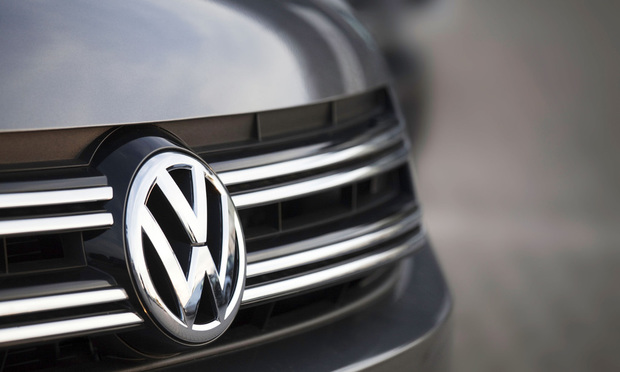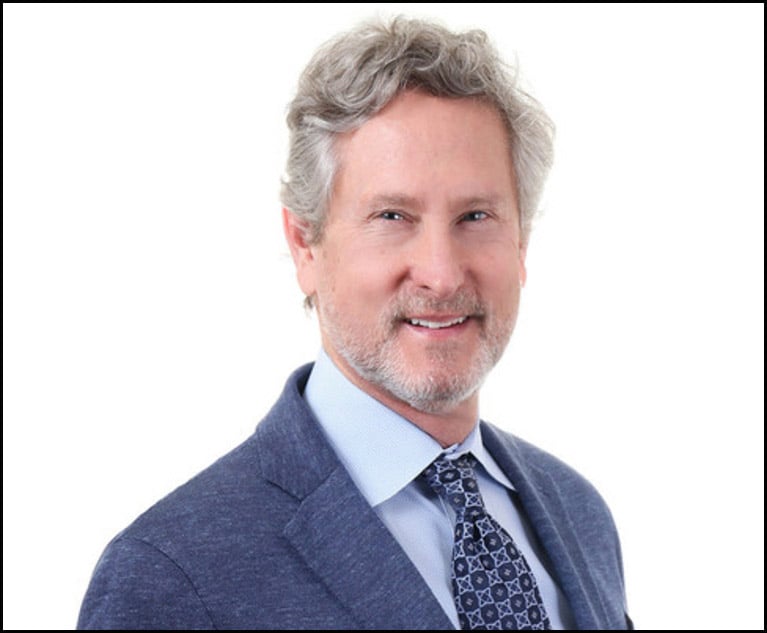Daily Dicta: VW Opt-Out Plaintiffs Crash with Minuscule Damages
A San Francisco federal jury this week awarded the first 10 bellwether plaintiffs a combined $5,747 in compensatory damages—which is just sad.
March 05, 2020 at 01:55 AM
6 minute read
 You know the old saying about a bird in the hand? The VW opt-out plaintiffs are learning it the hard way.
You know the old saying about a bird in the hand? The VW opt-out plaintiffs are learning it the hard way.
Rather than taking VW's (quite generous) settlement offer in the wake of the diesel emissions scandal, a handful of car owners went to trial, seeking reimbursement for the full amount that they paid to purchase or lease their cars, plus other penalties.
Instead, a San Francisco federal jury this week awarded the first 10 bellwether plaintiffs a combined $5,747 in compensatory damages—which is just sad. Five of the plaintiffs got no money at all.
It's not over yet—there's still a punitive damages phase. But with such a paltry compensatory award, the court isn't likely to uphold big-ticket punitives, should the jury opt to send a message to VW. (For example, last week the Ninth Circuit in Ramirez v. TransUnion held that the appropriate ratio between statutory and punitive damages was 4 to 1.)
"It's not like a drug company that's got a drug it's selling to people and people are getting cancer. That's not what happened here. They stopped immediately selling the 2-liter cars and then the 3-liter cars, right away," VW lawyer Robert Giuffra Jr., a partner at Sullivan & Cromwell, told U.S. District Judge Charles Breyer of the Northern District of California, according to a transcript of the proceedings.
 I suppose it was inevitable that out of 550,000 VW class members, a few were going to object, figuring that they were entitled to more money.
I suppose it was inevitable that out of 550,000 VW class members, a few were going to object, figuring that they were entitled to more money.
What's notable is that more than 99% of the class members actually took the deal. At this point, there are only 350 remaining opt outs. And if this trial is any indication, they may kick themselves for snubbing VW's offer.
For example, Kenneth and Maria Coon originally paid $77,957.11 for their 2014 Audi A6. "But for Volkswagen's fraudulent concealment of presence of the defeat device, plaintiffs would not have purchased the vehicle," they said in their complaint filed last year.
If they'd taken the VW settlement, they would have gotten $8,679.24 in cash, plus a free emissions repair. Instead, the jury awarded them zero in compensatory damages, determining that the fair market value of their car was not actually diminished because of the emissions problem.
The result is a testament to VW's expert, Stanford Professor Timothy Bresnahan, the former chief economist of the Justice Department's Antitrust Division. He crunched the numbers to determine how much the emissions scandal hurt the value of the cars.
His answer? Not much—a mere 4.4% on average.
Plaintiffs lawyer Bryan Altman of Altman Law Group in his opening attacked Bresnahan, pointing to his $1,000 hourly rate and suggesting that because VW gave money to Stanford ($5.75 million 11 years ago), the professor was now in the automaker's pocket.
"[T]he actual data he used has been creatively manipulated," Altman told the jury. "In fact, this expert will only focus on what he claims is a fair market value that he claims will show what was lost by these people. He will not focus on the amount of money these people spent in reliance."
But the plaintiffs didn't offer their own competing expert. Instead, they tried to undermine Bresnahan on the concept of fair market value.
"Is it reasonable for a vehicle that's not in compliance with the law to be driven, to be sold, to be resold? Is that a reasonable thing? Does a willing buyer even exist?" Altman said in his closing. "Dr. Bresnahan wants you to believe that a consumer would pay nearly $70,000 for a motor vehicle knowing that it was in violation of the most basic emissions standards. That's what they're asking you to buy into here."
But Giuffra in his closing skillfully countered the claims. "These cars were valuable. They provided great fuel economy, mileage. There was a valuable warranty, performance, comfort. The only issue is the cars had a defeat device. That's the only issue that's in this case."
Fair market value, he continued, isn't about one plaintiff's subjective view—i.e. I wouldn't have bought the car. "The only question is, 'Well, once folks knew there was a defeat device in the car, what was the car worth?' That's the fair market question that you all need to decide," he said. "The fact that these plaintiffs were angry that they bought these cars, that's not a basis for damages."
The plaintiffs lawyers seem inclined to blame their poor showing on Breyer, who has been immersed in all aspects of the VW emissions scandal since 2015, including the $14.7 billion settlement that covered vehicle owners.
Last month, the plaintiffs asked the judge to disqualify himself. "Judge Breyer has a dog in this fight," wrote Altman, and Lauren Ungs, managing partner of Knight Law Group's office in Oakland, California. "He has a vested interest in determining that the settlement he presided over and approved was a fair resolution of consumer claims."
Breyer declined to step down.
On March 1, plaintiffs counsel tried again, filing a motion for a mistrial. "[T]he court's comments have gone beyond the traditional boundaries and have become so one-sided as to become advocacy," they wrote. "The court's comments and questions have shown hostility and skepticism towards the plaintiffs, plaintiffs' counsel, or the merits of their case in the presence of the jury, and have operated to taint the jury's perception of the merits."
The motion is pending—and the tension it's created was evident, especially when the jury wasn't present. Breyer in rebuking Altman for misstatements during closing arguments said, "The problem you have, counsel, is of course you moved for a mistrial. And so that essentially … gives you complete liberty to say whatever you want about the theory, about the evidence and so forth, because if Volkswagen moves for a mistrial, you've gotten exactly what you want out of this case, which is a mistrial."
This content has been archived. It is available through our partners, LexisNexis® and Bloomberg Law.
To view this content, please continue to their sites.
Not a Lexis Subscriber?
Subscribe Now
Not a Bloomberg Law Subscriber?
Subscribe Now
NOT FOR REPRINT
© 2025 ALM Global, LLC, All Rights Reserved. Request academic re-use from www.copyright.com. All other uses, submit a request to [email protected]. For more information visit Asset & Logo Licensing.
You Might Like
View All
Litigators of the Week: A $630M Antitrust Settlement for Automotive Software Vendors—$140M More Than Alleged Overcharges

Shareholder Democracy? The Chatter Elon Musk’s Tesla Pay Case Is Spurring Between Lawyers and Clients
6 minute read
Litigation Leaders: Mark Jones of Nelson Mullins on Helping Clients Assemble ‘Dream Teams’

Litigators of the Week: Rolling Back Elon Musk's $56B Tesla Compensation Package
Law Firms Mentioned
Trending Stories
- 1Public Notices/Calendars
- 2Wednesday Newspaper
- 3Decision of the Day: Qui Tam Relators Do Not Plausibly Claim Firm Avoided Tax Obligations Through Visa Applications, Circuit Finds
- 4Judicial Ethics Opinion 24-116
- 5Big Law Firms Sheppard Mullin, Morgan Lewis and Baker Botts Add Partners in Houston
Who Got The Work
J. Brugh Lower of Gibbons has entered an appearance for industrial equipment supplier Devco Corporation in a pending trademark infringement lawsuit. The suit, accusing the defendant of selling knock-off Graco products, was filed Dec. 18 in New Jersey District Court by Rivkin Radler on behalf of Graco Inc. and Graco Minnesota. The case, assigned to U.S. District Judge Zahid N. Quraishi, is 3:24-cv-11294, Graco Inc. et al v. Devco Corporation.
Who Got The Work
Rebecca Maller-Stein and Kent A. Yalowitz of Arnold & Porter Kaye Scholer have entered their appearances for Hanaco Venture Capital and its executives, Lior Prosor and David Frankel, in a pending securities lawsuit. The action, filed on Dec. 24 in New York Southern District Court by Zell, Aron & Co. on behalf of Goldeneye Advisors, accuses the defendants of negligently and fraudulently managing the plaintiff's $1 million investment. The case, assigned to U.S. District Judge Vernon S. Broderick, is 1:24-cv-09918, Goldeneye Advisors, LLC v. Hanaco Venture Capital, Ltd. et al.
Who Got The Work
Attorneys from A&O Shearman has stepped in as defense counsel for Toronto-Dominion Bank and other defendants in a pending securities class action. The suit, filed Dec. 11 in New York Southern District Court by Bleichmar Fonti & Auld, accuses the defendants of concealing the bank's 'pervasive' deficiencies in regards to its compliance with the Bank Secrecy Act and the quality of its anti-money laundering controls. The case, assigned to U.S. District Judge Arun Subramanian, is 1:24-cv-09445, Gonzalez v. The Toronto-Dominion Bank et al.
Who Got The Work
Crown Castle International, a Pennsylvania company providing shared communications infrastructure, has turned to Luke D. Wolf of Gordon Rees Scully Mansukhani to fend off a pending breach-of-contract lawsuit. The court action, filed Nov. 25 in Michigan Eastern District Court by Hooper Hathaway PC on behalf of The Town Residences LLC, accuses Crown Castle of failing to transfer approximately $30,000 in utility payments from T-Mobile in breach of a roof-top lease and assignment agreement. The case, assigned to U.S. District Judge Susan K. Declercq, is 2:24-cv-13131, The Town Residences LLC v. T-Mobile US, Inc. et al.
Who Got The Work
Wilfred P. Coronato and Daniel M. Schwartz of McCarter & English have stepped in as defense counsel to Electrolux Home Products Inc. in a pending product liability lawsuit. The court action, filed Nov. 26 in New York Eastern District Court by Poulos Lopiccolo PC and Nagel Rice LLP on behalf of David Stern, alleges that the defendant's refrigerators’ drawers and shelving repeatedly break and fall apart within months after purchase. The case, assigned to U.S. District Judge Joan M. Azrack, is 2:24-cv-08204, Stern v. Electrolux Home Products, Inc.
Featured Firms
Law Offices of Gary Martin Hays & Associates, P.C.
(470) 294-1674
Law Offices of Mark E. Salomone
(857) 444-6468
Smith & Hassler
(713) 739-1250






